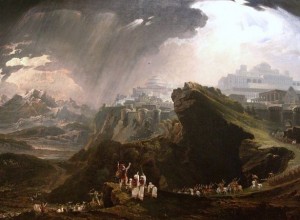Holy Warrior

God miraculously causes the sun to stand still, allowing the Israelites under Yehoshua’s command to win the battle (painting by John Martin)
Hoshea bin Nun (c. 1355-1245 BCE) was born in Egypt during the time of the Israelite slavery. Upon the return of Moses, Hoshea became his trusted servant and right-hand man. He was the only one allowed to approach Mt. Sinai other than Moses himself, and is one of the few people in the Torah described as being filled with a Godly spirit. In the wilderness, he became the chief military commander of the Israelite army, leading them to multiple victories. When the Israelites originally reached the Holy Land, Hoshea was dispatched as one of the twelve spies. It was then that Moses renamed him Yehoshua (more commonly known as Joshua), to give him strength for his mission. He was the only one, along with Caleb, to bring back a positive report, and for this was rewarded with permission to enter the land of Israel, while the rest of the generation was condemned to perish in the wilderness over a forty year period. At the end of those forty years, when Moses passed away, Yehoshua took over and led the Jews into Israel, overseeing their successful reclamation and re-settlement of the land with a series of miraculous victories. His work complete, Yehoshua passed away in the Holy Land at the age of 110, having gained a reputation for wisdom, humility, and most of all, being a beloved caretaker of his people. He is believed to be the author of the Biblical book of Joshua. As his origins are obscure, and he alone has the moniker “bin” in his name (as opposed to the standard “ben”, which means son), several legends have come forth regarding his birth. In one of the most enigmatic, it is said that the baby Yehoshua was among those newborns thrown into the Nile River by Pharaoh’s soldiers. However, he was swallowed up by a great fish which was later caught by fishermen; Yehoshua was thereby accidentally rescued from the fish’s belly, hence the name “bin Nun” (nun means “fish” in Aramaic). Yehoshua’s yahrzeit is commemorated on the 26th of Nisan, which this year falls on Saturday.
Words of the Week
The Persian Empire was always against the Muslim Arab Empire, especially against the Sunnis. The threat is from Persia, not from Israel.
– Saudi Prince Alwaleed bin Talal


